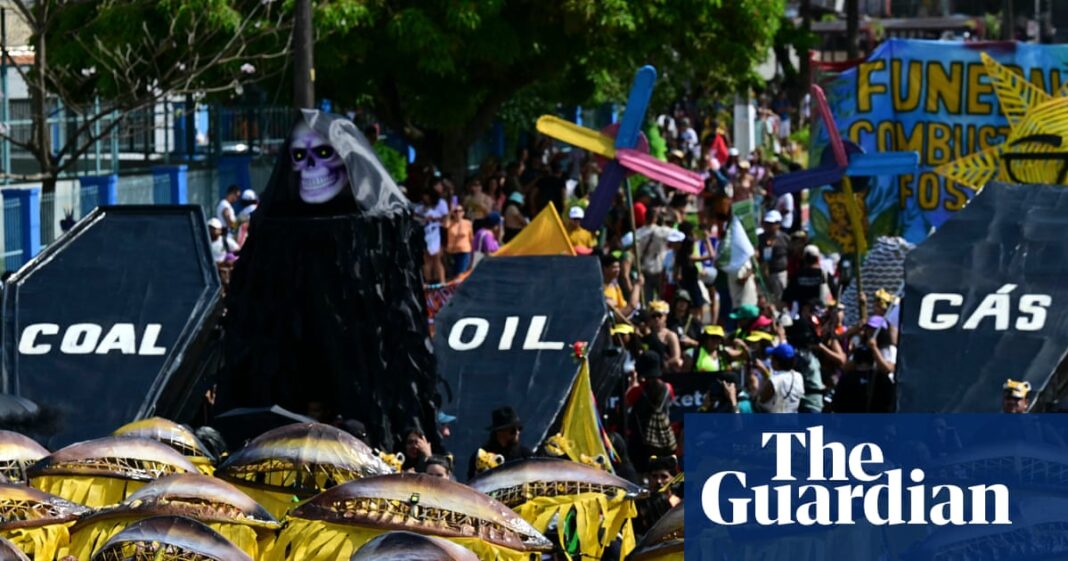What is the transition away from fossil fuels?
Coal, oil and gas are at the heart of the climate crisis: burning them produces carbon dioxide, and that is heating the planet, so far to 1.5C above preindustrial levels, and in future perhaps to more than 2.5C, a level that would lead to widespread and irreversible damage. Only by ending the use of fossil fuels can we hope to halt the upward march of temperatures, and recover a livable climate. But modern economies have grown rich on 200 years of fossil fuel use, and until recently – in the past 20 years, when advances in wind and solar power and electric vehicles made possible societies based on renewable energy – there was little alternative.
Why is it controversial for a climate conference to talk about fossil fuels?
For more than 30 years, since “conference of the parties” meetings have been happening under the 1992 UN framework convention on climate change, fossil fuels have been the “elephant in the room”. The strength of the UNFCCC is that it includes every country, bar a few failed states (even the US, which has withdrawn from the Paris agreement and sent no delegate to Cop30, remains a signatory to the parent treaty). But that is also its weakness – to achieve universality, petrostates such as Saudi Arabia, Qatar and Russia were given an equal place at the table with all other nations. They used this to effectively veto any real discussion of fossil fuels, in favour of a focus on “greenhouse gas emissions” (which can also come from deforestation, agriculture and industrial sources, though these account for far less of the global emissions total than fossil fuels).
When was it discussed?
At the Cop28 conference, held in Dubai in 2023, nations agreed for the first time to “transition away from fossil fuels”. The historic pledge came buried in paragraph 28 of the “global stocktake”, an assessment of how far off track countries were from fulfilling the Paris agreement goal of limiting temperature rises to 1.5C.
That it passed came as a surprise to many, given the vehement opposition among many oil- and gas-producing nations to any mention of fossil fuels in Cop decisions – and Cop28 was held in the United Arab Emirates, a petrostate, and was presided over by Sultan Al Jaber, chief executive of UAE’s national oil company. Ahead of the conference, campaigners called for him to be sacked – yet, behind the closed doors of the negotiating rooms, he earned plaudits from Cop veterans who concluded that perhaps only an oilman, with his impeccable petrostate credentials and connections, could have achieved it. (Despite the resolution, Al Jaber made no move to scale back plans to expand the exploitation of UAE’s reserves.)
At last! So how was it put into practice?
It was not. Almost as soon as Cop28 had closed, some countries – notably Saudi Arabia – were trying to unpick the deal. Saudi officials claimed the “transition away from fossil fuels” was not a real commitment, just one option among many. When other countries wanted to build on the resolution the next year at the Cop29 conference in Azerbaijan (another economy almost entirely dependent on oil and gas exports), they were stymied by overt and covert opposition.
Why has it come up at Cop30?
The countries that want to see a “transition away from fossil fuels” – which include the UK, many EU member states, and a host of poor and vulnerable developing countries – have not given up. They argue that previous Cop decisions cannot be erased and must be built on, and that agreeing on a timetable and roadmap for the phaseout are the best route to fulfilling the Paris goals and avoiding the worst ravages of climate breakdown.
So is it on the agenda, and will it be discussed?
No, and yes. The transition away from fossil fuels will not appear on the formal agenda for Cop30, but it will be widely and deeply discussed at the conference. There are several ideas for how to move forward – Colombia is the prime mover behind a proposed declaration in support of the transition away from fossil fuels, and more than a dozen nations have signed up to the “fossil fuel nonproliferation treaty”, while some other countries and NGOs favour a roadmap. None of these initiatives is mutually exclusive.
Brazil, host nation of Cop30, argues it has no real power over the agenda, but can only be guided by what parties want. This is true up to a point, though if the presidency wanted a discussion of the transition away from fossil fuels it could be managed. However, Brazil believes there is not enough support for an agenda item, and that if attempts were made to put it on the agenda, and subject to a formal Cop decision, they could fail – as they did at Cop29, where the discussions that would have included it were effectively abandoned.
If it is not on the agenda, how can it be discussed?
Cops are big, complex places, where nearly 200 countries and tens of thousands of delegates hold meetings on everything from food security to ocean heatwaves. Outside the formal agenda, with its 145 items, Brazil is running a series of parallel discussions called “the action agenda”, where countries can talk about their achievements in “implementing” their commitments on the climate.
Items on the formal agenda can only be passed by consensus – a slippery concept that does not quite mean unanimity, as the chair can bring down the gavel even if there are still a small number of holdouts, but it means that anything without almost universal support (however grudging) will not pass.
Outside the formal agenda, on the action agenda or in other discussions, there is no such requirement.
So could Cop30 produce a roadmap to the transition away from fossil fuels?
No. There is not enough time during the fortnight of discussions to produce such a complex document. A roadmap would need to set out a form of timetable, however vague, and measures that countries would agree to take, and milestones they should reach. Given the disparity among countries, ranging from those that lack any fossil fuel resources to those almost entirely dependent on them, that will need to cover vast differences.
What proponents of a roadmap are hoping for is that this Cop could agree to begin a process that could go on for several years, cycling two or three more Cop presidencies, which would set up a forum in which all countries – producers and consumers of fossil fuels – could participate in free-ranging, nonbinding and frank conversations. “It’s about creating a safe space where they can be heard,” says one civil society advocate.
Would the roadmap be binding?
Certainly not in its initial stages, and possibly not ever. The original pledge, in paragraph 28 of the Cop28 decision on the global stocktake, remains valid and is binding under the UNFCCC process. But most proponents take the view that assembling a “coalition of the willing” who agree to begin the journey towards a phaseout is the best step for now, rather than aiming for a stronger commitment that could be more easily shot down.
Who supports the transition away from fossil fuels?
Several EU states, though the EU as a whole has not taken a formal negotiating position yet. The UK, Australia, many small island states, dozens of vulnerable countries and some mid-size developing economies, including Colombia, Chile and Kenya. Even Nigeria, a heavily oil-dependent state, has expressed an interest. Supporters number about 60 or so, according to one estimate, but at least 40 countries are thought to be opposed to the idea.
What is the likely outcome?
If enough countries come forward to support a roadmap or similar format, a forum could be set up at this Cop to bring countries together in ongoing discussions that could lead to a roadmap by Cop31 or Cop32. That would be a major step forward.
But making progress will rely on future Cop presidencies – at present, it is not known whether Australia or Turkey will win the competition to host Cop31, and Cop32 will be in Ethiopia. Cop33 could be in India, which in the final stages of Cop26 in Glasgow insisted a “phaseout” of coal, which had been agreed by all parties, must be weakened to a “phasedown”.


